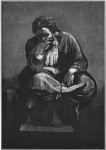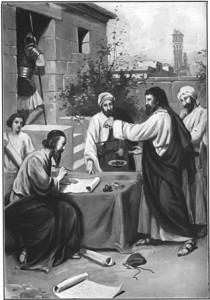From Jeremiah 32-34
 When is a good time to buy property? Would you buy property if you knew a major crash in the economy was imminent? Jeremiah does. But his logic reflects a long term perspective. He looks to the future and this perspective determine his actions. Jesus’ also commands us to work for eternal things.
When is a good time to buy property? Would you buy property if you knew a major crash in the economy was imminent? Jeremiah does. But his logic reflects a long term perspective. He looks to the future and this perspective determine his actions. Jesus’ also commands us to work for eternal things.
This post is part of my bible in a year series.
Passage and Comment
Jeremiah has something to say when Jerusalem is under siege.
32 The word that came to Jeremiah from the LORD in the tenth year of Zedekiah king of Judah, which was the eighteenth year of Nebuchadnezzar. 2 At that time the army of the king of Babylon was besieging Jerusalem, and Jeremiah the prophet was shut up in the court of the guard that was in the palace of the king of Judah. (Jer 32.1-2)
Jerusalem is under siege by the Babylonians. Inside the city, Jeremiah is a prisoner. Locked up, under guard in the palace of the king. He is shut up in the court because he has said something that offended Zedekiah the king.
3 For Zedekiah king of Judah had imprisoned him, saying, “Why do you prophesy and say, ‘Thus says the LORD: Behold, I am giving this city into the hand of the king of Babylon, and he shall capture it; 4 Zedekiah king of Judah shall not escape out of the hand of the Chaldeans, but shall surely be given into the hand of the king of Babylon, and shall speak with him face to face and see him eye to eye. 5 And he shall take Zedekiah to Babylon, and there he shall remain until I visit him, declares the LORD. Though you fight against the Chaldeans, you shall not succeed’?” (Jer 32.3-5)
Jeremiah was shut up under guard because he had prophesied the Babylonians would win the conflict. Jerusalem would be taken. Zedekiah himself will be captured and be brought to the king of Babylon. This is unwelcome news for Zedekiah.
Zedekiah can do nothing to avert the will of God. All things work by his plan.
The LORD speaks to Jeremiah and commands him to do something strange considering his circumstances.
6 Jeremiah said, “The word of the LORD came to me: 7 Behold, Hanamel the son of Shallum your uncle will come to you and say, ‘Buy my field that is at Anathoth, for the right of redemption by purchase is yours.’
8 Then Hanamel my cousin came to me in the court of the guard, in accordance with the word of the LORD, and said to me, ‘Buy my field that is at Anathoth in the land of Benjamin, for the right of possession and redemption is yours; buy it for yourself.’ Then I knew that this was the word of the LORD. (Jer 32.6-8)
Jeremiah is told by the LORD his uncle will come by and ask him to purchase his field.
The LORD tells people in advance what the future will be. Prophesy.
In the law of Moses, people could sell off their inheritance (land) and were always given the ability to redeem it back. At the end of a Jubilee period it would be returned anyway. The intention of these rules was make sure the family inheritance stayed with the family.
Jeremiah’s uncle does what the LORD predicted in accordance with his word.
9 “And I bought the field at Anathoth from Hanamel my cousin, and weighed out the money to him, seventeen shekels of silver. 10 I signed the deed, sealed it, got witnesses, and weighed the money on scales. 11 Then I took the sealed deed of purchase, containing the terms and conditions and the open copy. 12 And I gave the deed of purchase to Baruch the son of Neriah son of Mahseiah, in the presence of Hanamel my cousin, in the presence of the witnesses who signed the deed of purchase, and in the presence of all the Judeans who were sitting in the court of the guard. (Jer 32.9-12)
So in response the the fulfillment of the LORD’s word, Jeremiah redeems his family inheritance following the normal contractual means of his day. Money, deed signed, sealed and witnesses.
13 I charged Baruch in their presence, saying, 14 ‘Thus says the LORD of hosts, the God of Israel: Take these deeds, both this sealed deed of purchase and this open deed, and put them in an earthenware vessel, that they may last for a long time. 15 For thus says the LORD of hosts, the God of Israel: Houses and fields and vineyards shall again be bought in this land.’ (Jer 32.13-15)
Jeremiah stores the deeds in an earthenware vessel for safekeeping. He gives another more important reason why he redeemed his inheritance. Houses and fields and vineyards shall again be bought in this land.
He believes things will change in the future. Change for the better.
Story of Israel

Jeremiah purchased the property because he believed in the LORD’s prophecy. His belief in what the future would hold changed his actions.
All divinely inspired prophecy achieves its purpose. Scripture records the fulfilment of many prophecies. All prophecy achieves its purpose (Is 55:10–11; Dt 18:22).
The LORD gives a range of different prophecies. Some for individuals (1 Ki 8:15–21; 20:35–36). Some for the nation of Israel (1 Ki 11:29–39; 12:15). The LORD prophesied the coming Babylonian exile and this is what makes Jeremiah’s actions so strange.
17 Behold, the days are coming, when all that is in your house, and that which your fathers have stored up till this day, shall be carried to Babylon. Nothing shall be left, says the Lord. 18 And some of your own sons, who shall be born to you, shall be taken away, and they shall be eunuchs in the palace of the king of Babylon.” (2 Ki 20:17–18)
Presumably he knows what is about to happen. He preached these events to Zedekiah and thats why he is shut up under guard. Why did Jeremiah redeem the property knowing this? Because of another prophesy.
15 For thus says the LORD of hosts, the God of Israel: Houses and fields and vineyards shall again be bought in this land.’ (Jer 32.15)
Israel would return to the promised land.
Story of Jesus
In the gospel according to John, Jesus speaks a lot about eternal things. In this respect Jesus encourages his followers to work and live with the future in mind.
22 On the next day the crowd that remained on the other side of the sea saw that there had been only one boat there, and that Jesus had not entered the boat with his disciples, but that his disciples had gone away alone. 23 Other boats from Tiberias came near the place where they had eaten the bread after the Lord had given thanks. 24 So when the crowd saw that Jesus was not there, nor his disciples, they themselves got into the boats and went to Capernaum, seeking Jesus.
25 When they found him on the other side of the sea, they said to him, “Rabbi, when did you come here?” 26 Jesus answered them, “Truly, truly, I say to you, you are seeking me, not because you saw signs, but because you ate your fill of the loaves.
27 Do not work for the food that perishes, but for the food that endures to eternal life, which the Son of Man will give to you. For on him God the Father has set his seal.”
28 Then they said to him, “What must we do, to be doing the works of God?” 29 Jesus answered them, “This is the work of God, that you believe in him whom he has sent.” (Jn 6:22–29)
Jeremiah bought the field because he believed in a brighter future. Jesus looks to the future as well. He points us away from what perishes. He encourages us to work for what is eternal. The primary work is believing in Jesus. This future Jesus shaped perspective should influence the way we live now.
Copyright © Joshua Washington and thescripturesays, 2015. All Rights Reserved.

